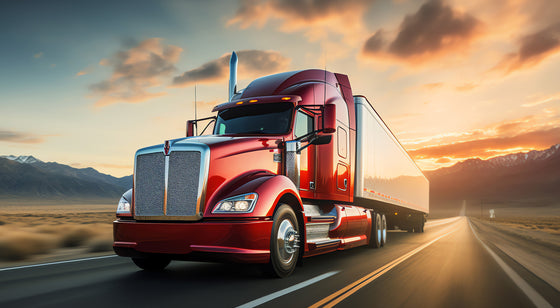
For years, diesel fuel has been the primary engine fuel for the trucking industry. However, with the urgent need to reduce greenhouse gas emissions for environmental and regulatory reasons, alternative fuels are becoming increasingly popular. Electric, compressed natural gas(CNG), and renewable natural gas(RNG) are the top three alternative fuels in the class 8 vehicle market. In this article, we will compare and contrast these three alternative fuels and discuss their potential benefits and drawbacks.
Compressed natural gas, or CNG, is a fuel that’s been used in the transportation industry for several decades. CNG fuel consists mainly of methane gas and is stored under high pressure in a compressed gas cylinder. The fuel provides a cleaner-burning fuel alternative to diesel, as it produces lower levels of emissions such as particulate matter (PM), nitrogen oxides (NOx), and carbon dioxide (CO2).
A major benefit to CNG vehicles is the lower cost of fuel when compared to diesel fuel. Another benefit of CNG vehicles is lower emissions. According to the US Department of Energy, natural gas produces fewer greenhouse gas emissions than diesel fuel. The emissions and cost reduction using CNG can help companies meet regulatory requirements for cleaner vehicles and while also reducing their bottom line.
One disadvantage to CNG vehicles is the requirement for storing the fuel in large, high pressure tanks. The tanks can be heavy and require a significant amount of space on or inside the vehicle. Another potential drawback is that the network of refueling infrastructure is limited in comparison to diesel.
Renewable natural gas (RNG) is a fuel derived from organic waste, such as landfills, wastewater treatment plants, or agricultural waste. The fuel is processed and cleaned to remove impurities and can be used in the same applications as CNG fuel.
The most notable benefit to RNG vehicles is that because the fuel is produced using organic waste, it has the most significant environmental benefit of the three alternative fuels discussed. According to the Coalition for Renewable Natural Gas, "RNG produced from dairy farms reduced GHG emissions by up to 400% compared to diesel." Much like CNG, RNG has a modest investment requirement for fleet conversion.
One major drawback of RNG that fleet owners see is the availability of infrastructure. While it is growing rapidly, the current market is limited, especially in comparison to diesel fuel.
Electric vehicles (EVs) are a newer and rapidly growing alternative to fossil fuels in the transportation industry. EVs use electricity stored in batteries to power electric motors.
One of the key benefits to electric vehicles is the potential for zero emissions they can produce. The vehicle itself does not produce any direct emissions, so if the electricity is generated from a renewable source, the electric vehicle can provide an emissions-free alternative to diesel.
The biggest drawback that electric vehicles show is the range limitation of the battery. Although major improvements have been made in the battery capacity, with Class 8 vehicles, there is still no electric solution that has the same range as a diesel-fueled engine. Another drawback many fleet owners see with electric vehicles is the investment required to convert to electric vehicles. Even with the government funding, electric infrastructure is incredibly expensive and can be seemingly impossible to switch to.
Dual Fuel vehicles consist mainly of diesel vehicles that are retro-fitted to run on a blend of CNG or RNG and diesel. They typically range from 20%-70% diesel displacement, allowing the diesel fleet to transition into alternative fuels.
The biggest benefit of dual fuel is that there is a lower price tag to the conversions. Fleets can keep their diesel assets, while making the switch to alternative fuels and can see the savings and emissions reduction in doing so.
One disadvantage of dual fuel vehicles is that they are still consuming diesel. This alternative fuel solution does not eliminate the need for diesel fuel, nor does it eradicate the emissions of diesel completely; however, this does allow for a smaller investment creating a quicker path to a ROI.
There is no one-size-fits-all solution when it comes to alternative fuels in the Class 8 vehicle industry. There are endless drawbacks and benefits to all fueling options, and each must be considered based on the specific operational needs of the customer.


